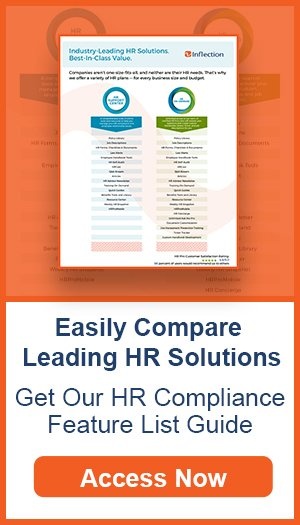Employers need to stay on top of labor law updates in 2025, as well as other 2025 HR trends, and make necessary adjustments to meet compliance requirements. This article summarizes all the federal and Arizona labor law changes in 2025, and prior years, and what actions need to be taken in order to stay compliant in the new year.
Minimum Wage Increase
There are 21 states and more than three dozen cities and counties that increased their minimum wages in January 2025. Employers need to make sure to make the proper adjustments if their state has a minimum wage increase. Recommended actions include:
- Review employee handbook to ensure policies regarding wage and hours, scheduling and compensation reflect the correct regulations
- Update labor law posters that were displayed in the workplace to reflect the change
- Review payroll system and make necessary changes to hourly wages that will be impacted
- Review compensation packages and implement best practices to optimize compensation management for better employee retention
- Review budget and see if this change will affect the funding amount for other projects
The 21 states that increased minimum wage are:
|
State |
2025 Minimum Wage |
2024 Minimum Wage |
|
Alaska |
$11.91 |
$11.73 |
|
Arizona |
$14.70 |
$14.35 |
|
California |
$16.50 |
$16.00 |
|
Colorado |
$14.81 |
$14.42 |
|
Connecticut |
$16.35 |
$15.69 |
|
Delaware |
$15.00 |
$13.25 |
|
Illinois |
$15.00 |
$14.00 |
|
Maine |
$14.65 |
$14.15 |
|
Michigan |
$10.48 |
$10.33 |
|
Minnesota |
$11.13 |
$10.85 |
|
Missouri |
$13.75 |
$12.30 |
|
Montana |
$10.55 |
$10.30 |
|
Nebraska |
$13.50 |
$12.00 |
|
New Jersey |
$15.49 |
$15.13 |
|
New York City |
$16.50 |
$16.00 |
|
New York |
$15.50 |
$15.00 |
|
Ohio |
$10.70 |
$10.45 |
|
Rhode Island |
$15.00 |
$14.00 |
|
South Dakota |
$11.50 |
$11.20 |
|
Vermont |
$14.01 |
$13.67 |
|
Virginia |
$12.41 |
$12.00 |
|
Washington |
$16.66 |
$16.28 |
Form I-9 Updates
As of November 1st, 2023, the old version of Form I-9 is no longer effective and all employers are required to start using the updated Form I-9 (edition date 08/01/23). This change was first announced on August 1st, 2023 by the USCIS. The updated Form I-9 reflects the option for eligible employees to verify employment eligibility remotely.
Employers must update their Form I-9 to the latest version. Failure to do so may result in penalties. Here’s what employers need to do to stay compliant:
- Update their current Form I-9 to the new version for future employees
- Complete a new Form I-9 for current employees who already have a Form I-9 on file
Pregnant Workers Fairness Act (PWFA)
Enforced by the EEOC, the Pregnant Workers Fairness Act (PWFA) has been effective since June 2023 and all covered employers must comply with this federal law and provide “reasonable accommodations” to a worker’s known limitations related to pregnancy, childbirth, or other related medical conditions.
Employers will need to comply with this law if they are private and public sector employers with at least 15 employees, Congress, Federal agencies, employment agencies, and labor organizations.
Providing Urgent Maternal Protections Act (PUMP)
The Department of Labor issued new legislation regarding the Providing Urgent Maternal Protections Act in April 2023. This law requires employers to provide reasonable break time for an employee to express breast milk for their nursing child and a place to pump at work, other than a bathroom. This place must be shielded from view and free from intrusion from coworkers and the public.
Arizona Labor Law Updates in 2025
Arizona Minimum Wage
As previously mentioned, Arizona’s minimum wage was increased to $14.70 on January 1st, 2025. The current $14.70 minimum wage in 2025 is up by $0.35, or 1.2% from the 2024 minimum wage of $14.35. This increase was based on inflation, as with many other changes in previous years.
Flagstaff Minimum Wage
Please note that the City of Flagstaff has its own minimum wage. On January 1st, 2025, Flagstaff’s minimum wage was increased to $17.85. The new rate for tipped employees is $16.85. The 2024 minimum wage for the city was $17.84 and $15.90 for tipped employees.
Arizona Paid Sick Leave Law
The Arizona Sick Leave Law has been in effect since 2017. Regardless of company size, Arizona employers must have a paid sick leave policy in place to ensure compliance. Here’s what employers need to do to stay compliant with Arizona paid sick leave:
- Review / draft up their paid sick leave policy
- Make sure to review the payroll system to reflect the correct paid sick leave rules
- Review and update processes for managing employee time off
- Display the most up-to-date Arizona paid sick leave notice or poster in the workplace
Manage Business Compliance with Automated Workforce Management Software
Staying on top of all the labor law regulation changes is not an easy task for employers. It might be a burden on your HR professionals and take them away from focusing on your people. Utilizing a unified workforce management software will help you re-allocate resources and manage compliance using a streamlined and automated system. Contact us today to learn more about how it’ll help your business succeed in every aspect. Or click here to request an Arizona Labor Law Poster from us.


